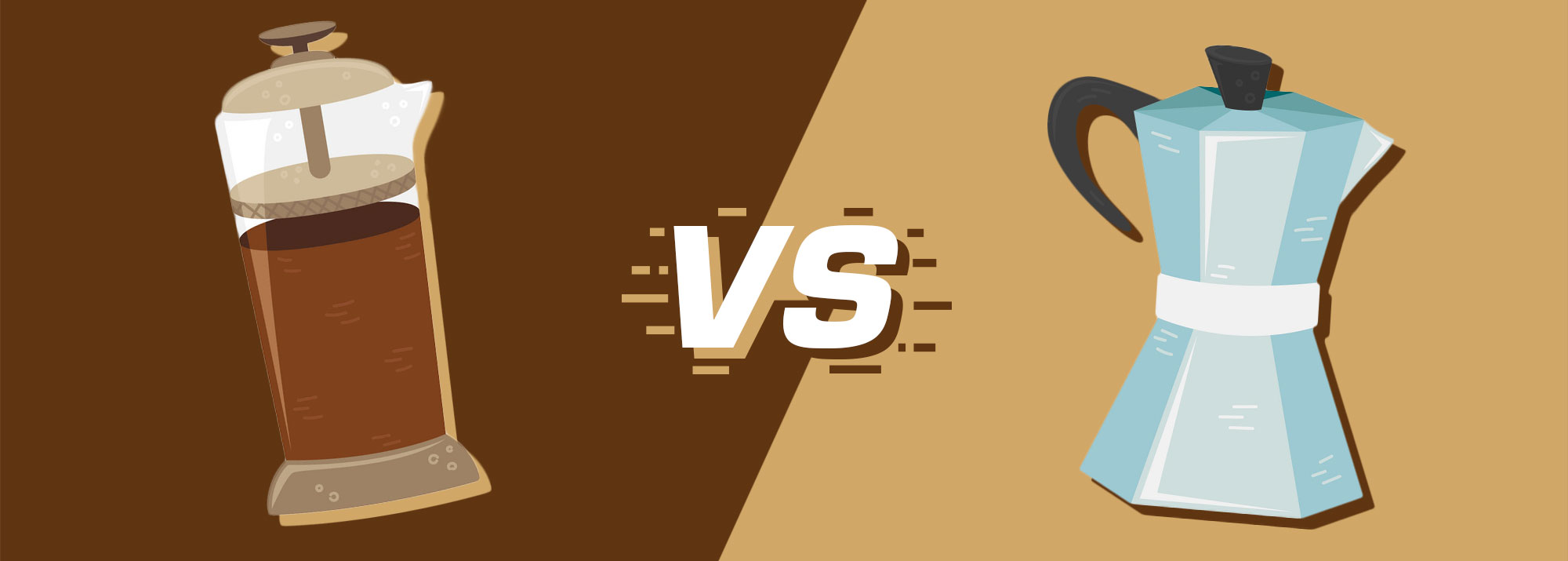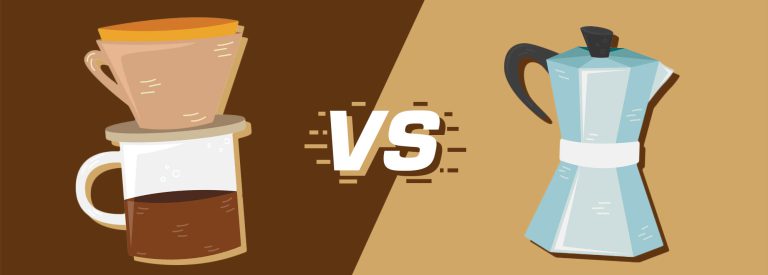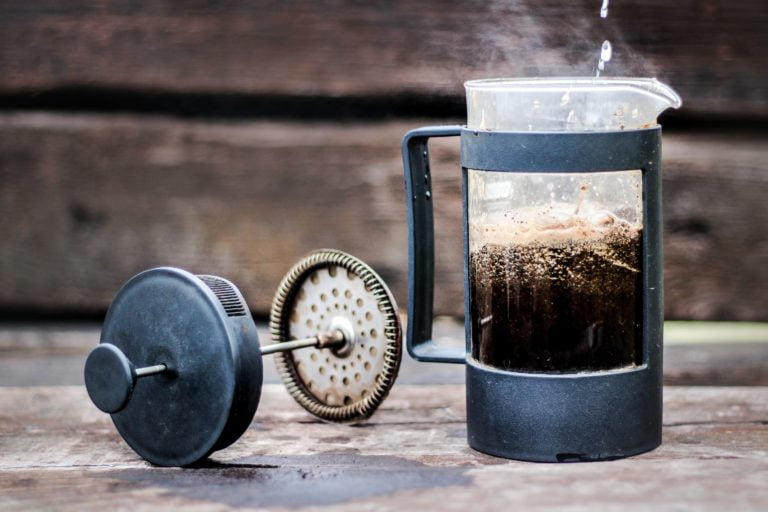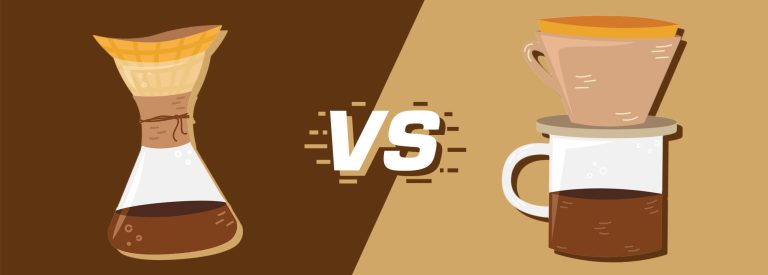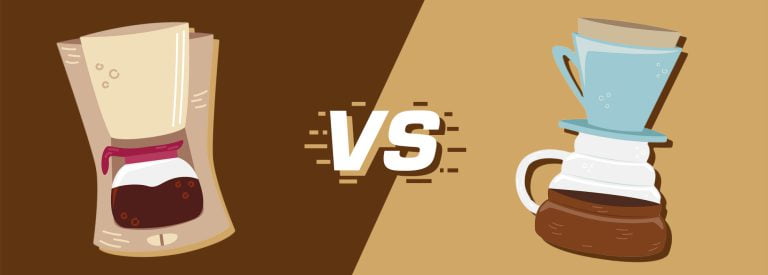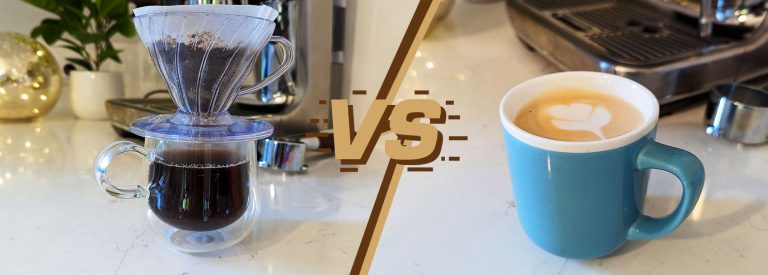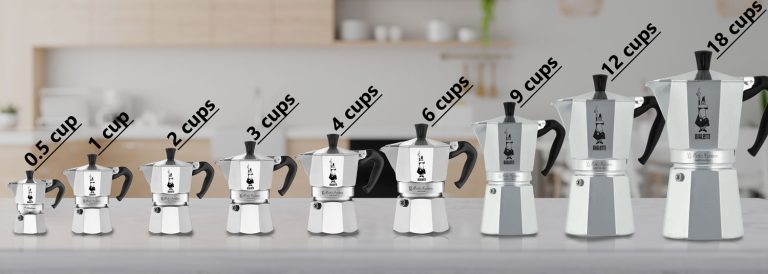French Press vs Moka Pot: A Barista’s Perspective
French press and moka pots have dominated the coffee brewing industry since the early 1900s so it’s pretty natural to ask, which one has aged better?
Today, I’ll be pitting the French press and moka pot in a brewer battle by discussing the different factors that could make or break a brewing method for you. After reading through, you should be able to make an informed decision when picking which method will cater to your needs.
Let’s dive in.
Comparing French Press & Moka Pot
So, which is better, the French Press or Moka Pot? It depends on what you’re looking for in your coffee.
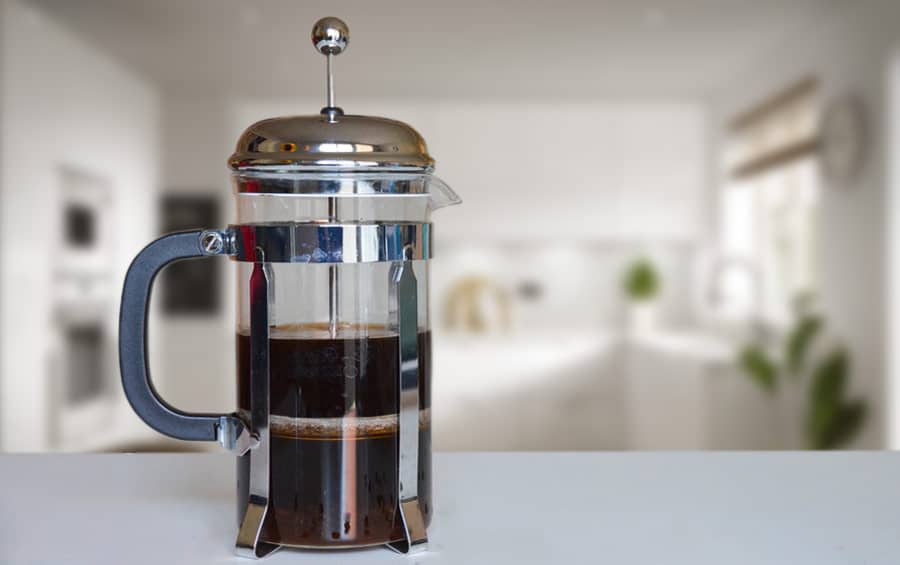
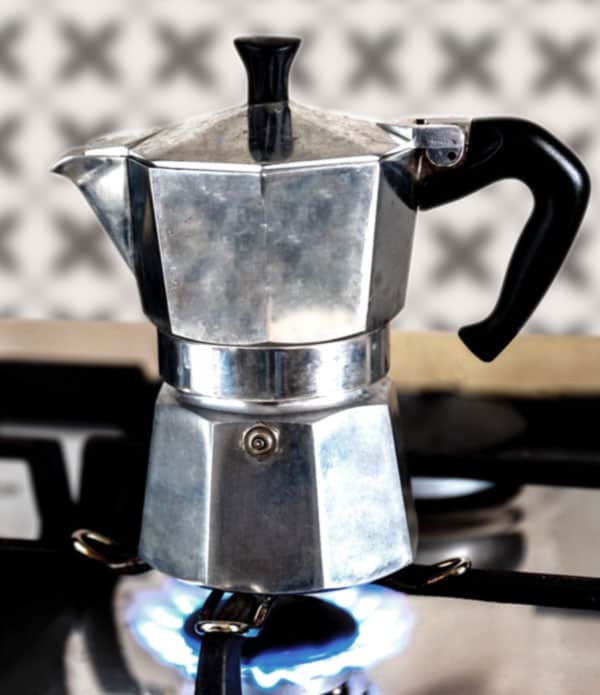
The French press is a cylindrical glass or stainless steel container that uses immersion brewing to make coffee. The process involves adding coarsely ground coffee beans into the press and pouring hot water over them. After letting it steep for several minutes, you push down on the plunger attached to a metal mesh screen, separating the ground coffee from the liquid.
Now let’s look at the Moka Pot. Sometimes called a caffettiera, Spanish coffee maker, or macchinetta, this stovetop device makes strong coffee similar in taste to espresso. It consists of three chambers: the bottom chamber holds water, while the middle chamber has a filter basket filled with finely ground coffee. As heat rises through the pot, it forces water through the grounds and up into the top chamber where it collects as brewed coffee ready to be poured.
Here are the factors to consider when picking between the two brewing methods, followed by a detailed comparison of each feature.
| Features | French Press | Moka Pot |
|---|---|---|
| Taste & Flavor | Full-bodied with robust flavors | Rich, full-bodied, slightly milder than espresso |
| Strength | Bold | Concentrated and robust |
| Ease of Use | Easy to use, requires pushing down plunger | Requires attention and heat regulation |
| Brewing Speed | 6-7 minutes | 10 minutes |
| Versatility | Limited to hot coffee, capacity flexibility | Adjust coffee-to-water ratio, more size options |
| Durability & Portability | Stainless steel models are durable and portable | Aluminum or stainless steel, portable |
| Sustainability | No disposable components, recyclable | No disposable components, recyclable |
| Cost | Starting from $20, can be over $100 | Ranging from $15 to $70 |
Taste, Flavor, & Strength
Both the French Press and Moka Pot offer unique and distinct experiences when it comes to taste and flavor. The French press produces a full-bodied cup of coffee with robust flavors that vary depending on the beans used. With its heavy body and strong taste, this brewing method is perfect for those who love bold coffee.
On the other hand, Moka pot creates a rich and full-bodied aromatic coffee that tastes similar to espresso but slightly milder in strength. Compared to the French press though, Moka Pot coffee is stronger as it produces concentrated and robust coffee.
Personally, I lean towards the French press because, despite its bold taste, it has more complexity in flavor and aroma than the Moka Pot. Ultimately, it all comes down to personal preference – whether you prefer a pure caffeine hit or want an accentuated flavor in your cup of joe.
Ease of Use
Talking about the simplicity of each brewing method, the French Press is really easy to use. You just immerse medium-coarse to coarse coffee grounds in hot water at 195°F to 205°F, and then push down on the plunger after a few minutes to keep all grinds at the bottom before pouring out your drink.
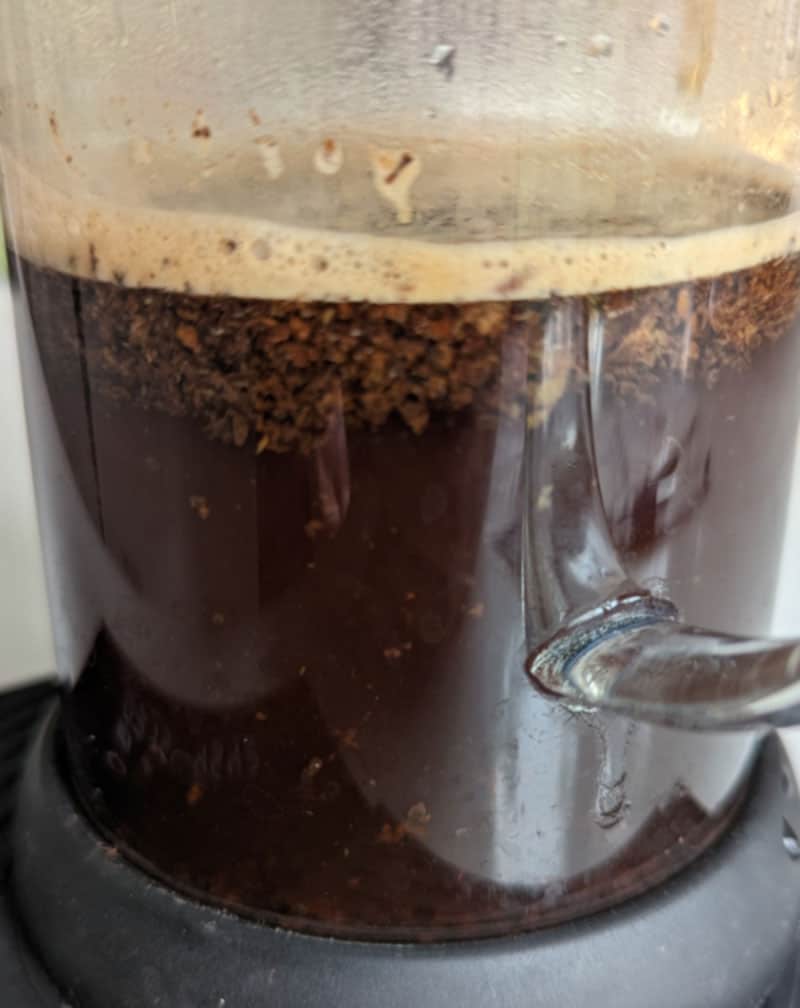
In contrast, using a Moka pot needs a bit more attention, as you must keep the water heat at around 212°F, keeping an eye on the brewing process along the way.
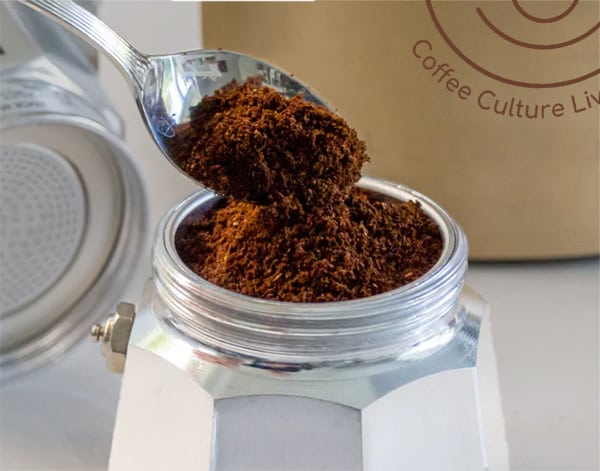
If we take everything into consideration when discussing which one is easier to use, the French Press edges past Moka Pot. While the latter seems to be a more straightforward process, control and consistency in your coffee are trickier to achieve.
Brewing Speed
Now to how fast you can fix a cup, the French press takes the lead over the Moka Pot. The total brewing time for a French Press is around 6 to 7 minutes, which includes grinding the beans, steeping, plunging, and cleaning up. The last step requires some effort as you have to disassemble the brewer and scrub out the grounds but overall it isn’t too difficult.
On the other hand, using a Moka Pot coffee takes longer to make at 10 minutes from start to finish. It takes 5 to 10 minutes for all the coffee to reach the top chamber, depending on the size of the pot. Cleaning time is about the same, since you have to reach remove coffee oils and grinds from small crevices in the filter basket.
So whenever you’re rushing to get that caffeine kick, go for the French press. It’ll save you a few minutes than brewing with its Italian counterpart, the Moka Pot.
Versatility
A very important aspect in brewing is the versatility of the method you’re using as it allows you to experiment with your cup and create a range of coffee drinks.
With the French Press, you are limited to making only one type of hot coffee beverage. You can also make cold brew if you want a different take on your cup. This brewing method does offer some capacity flexibility though.
The French Press is available in various sizes such as:
- 3-cup (350 ml)
- 4-cup (500 ml)
- 8-cup (1 L),
- 12-cup (1.5 L)
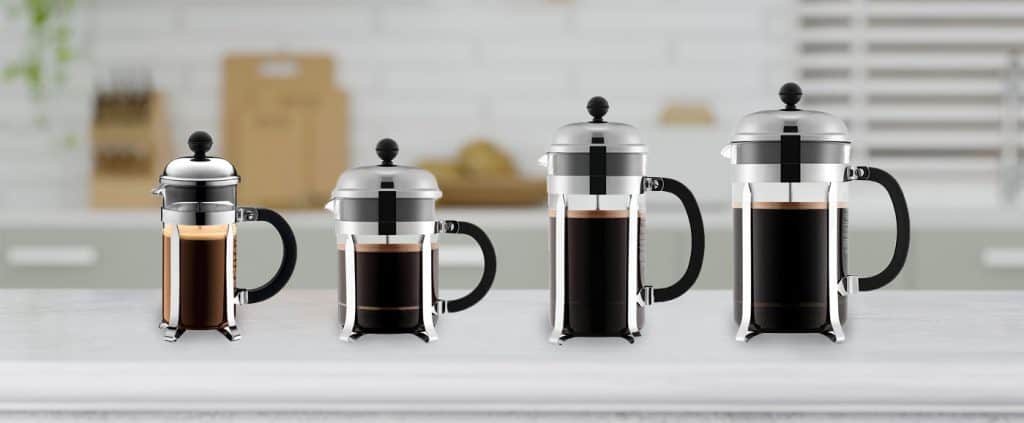
On the other hand, the Moka Pot offers more control than the French Press, allowing you to adjust the coffee-to-water ratio and grind size to some extent. This gives you more options for experimentation while still providing consistency in taste.
Additionally, the Moka Pot also comes in a very wide range of sizes:
- 0.5-cup (40 ml)
- 1-cup (60 ml)
- 2-cup (90 ml)
- 3-cup (130 ml)
- 4-cup (190 ml)
- 6-cup (340 ml)
- 9-cup (540 ml)
- 12-cup (670 ml)
- 18-cup (810 ml)
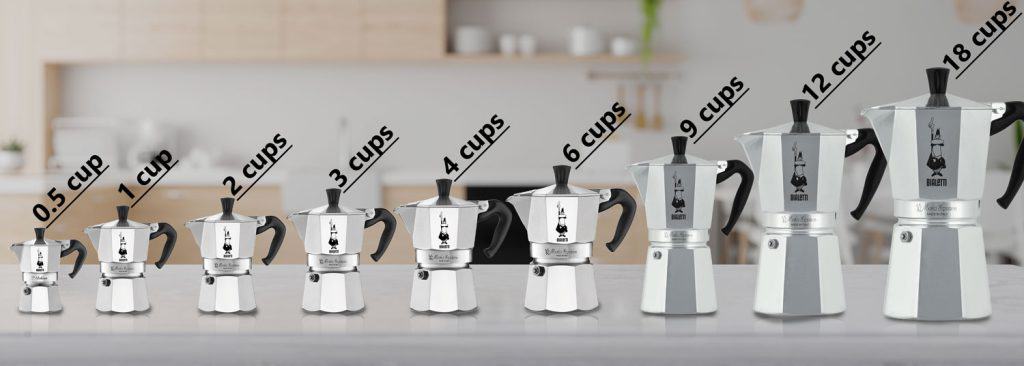
The French Press and Moka Pot may not be as versatile as the likes of the AeroPress, but between the two, the Moka Pot wins this category. It provides a greater degree of control over brewing variables and can be bought in a wider variety of sizes.
Durability and Portability
Being manual brewers that come in compact sizes, both the French Press and Moka Pot are two popular options in terms of durability and portability. But which one’s better?
The classic glass French Press models can be fragile, but stainless steel versions solve this issue by offering a more durable option that’s also portable. Both materials have their pros and cons.
On the other hand, moka pots are made of either aluminum or stainless steel which also make them generally durable and easy-to-carry with you from one place to another.
When it comes to sizes, the Moka Pot offers smaller models that can be as little as 130 mm (5 inches) in height while the standard 3-cup French Press is at 184 mm (7 inches). It is worth noting though that both brewers have handles that add bulkiness.
As for me, while the Moka Pot can be smaller and lighter, I still opt for my steel French Press during weekend getaways. Its smooth round shape just makes it easier to fit snugly in my bag compared to the Moka Pot, and the brewing process is more travel friendly since you don’t need a stovetop burner or a fire, just hot water.
Sustainability
Eco-friendliness in coffee is crucial, as it’s not just about indulging our taste buds but also preserving the environment.
French Press excels at being a sustainable, with no disposable components like paper filters and no electricity needed. Additionally, both glass and stainless steel models are recyclable further minimizing your carbon footprint.
A Moka Pot also has similar sustainable features. It works manually, no paper filters go to waste, and its steel or aluminum body can last decades and can both be recycled.
Both French Press and Moka Pot have their merits when it comes to sustainability, making this specific showdown a draw.
Cost
Now let’s look at the cost, which is pretty flexible for both the French Press and Moka Pot. The French press is generally more expensive with a starting price at around $20 which can go up to over a hundred dollars depending on size and material.
Meanwhile, Moka Pots are more affordable ranging between approximately $15 to $70, making it a great option for coffee lovers looking for delicious coffee without breaking the bank.
While Moka Pot wins affordability in pricing, I believe that both offer excellent value for money. You won’t need to invest in paper filters or constantly purchase replacement parts except when necessary.
French Press and Moka Pot – Weighing the Pros & Cons
Now that we’ve gotten a closer look at the features of each brewing method, here’s a quick overview of the pros and cons of French Press and Moka Pot so you can finally decide which one is for you:
| Brewing Method | Pros | Cons |
|---|---|---|
| French Press | – Easy to use – The glass material offers decent heat retention – Stainless steel models offer durability | – Some sediments get into your drink – Common glass build is prone to breakage. |
| Moka Pot | – Small and portable – Easy to use – Produces robust coffee similar to espresso | – Cleaning is a bit tougher – Limited control once the brewing has started – Can easily have a bitter taste. |
You can also read how French press stands in comparison to other brewing methods such as:
Meanwhile, here are the comparisons between Moka pots and other brewers:
Conclusion
To wrap things up, there’s no short answer as to which one is better, the French Press or the Moka Pot. It depends on different factors, and which of these factors you prioritize.
The French Press offers fast and easy brewing resulting in a robust cup while the Moka Pot gives you versatility and affordability in brewing an espresso-like coffee. And if you’re looking for sustainability, durability, and portability, you cannot go wrong either way.
Personally, if left only with these two options, I’d go for the French Press because of its simplicity. No, a Moka Pot because of how it makes near-espresso coffee. Oh no, I would choose both 🙂
Which brewing method is for you? Let me know in the comments below.

